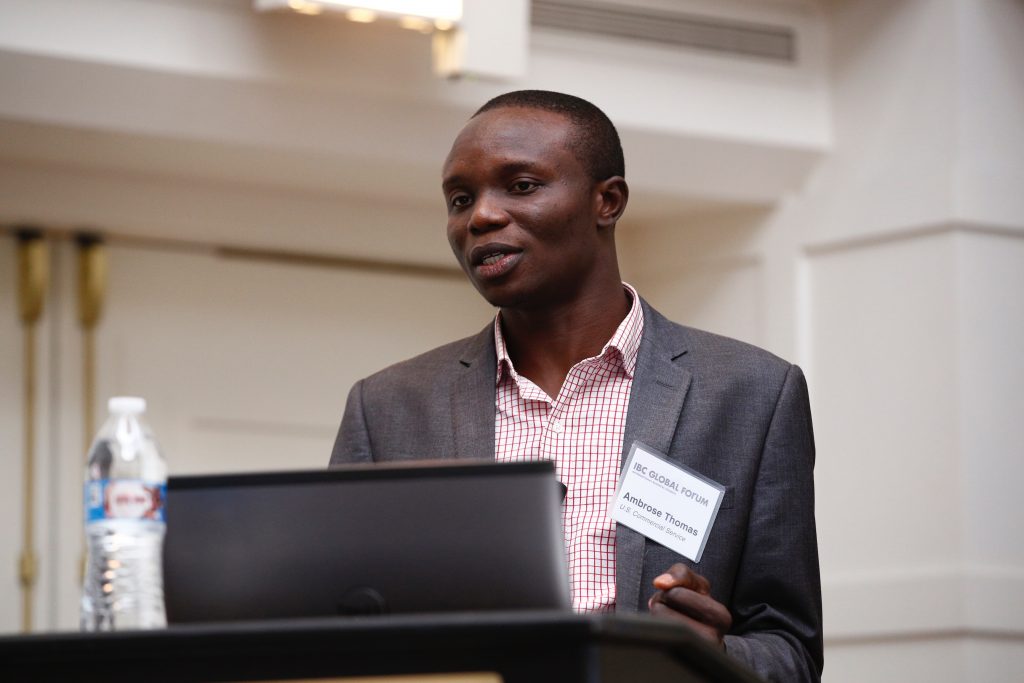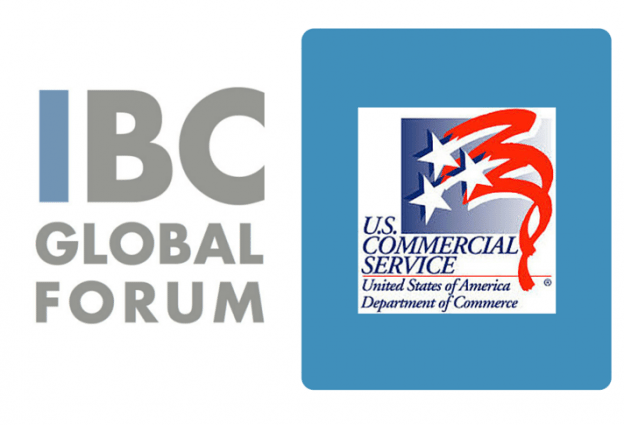After a multi-session deep dive into aspects of entering the mature markets of Europe, IBC Global Forum attendees were introduced to the work of a U.S. government agency charged with assisting companies in entering the emerging markets in Africa.
Ambrose Thomas, a commercial assistant with the U.S. Commercial Service in Nigeria, outlined the basic demographics and agency services. Mr. Thomas is responsible for developing personal/beauty care, print/graphics, retail/consumer goods, as well as the fashion and apparel industries. He supports a wide range of commercial service programs and activities including the Networking with USA program. In addition, Mr. Thomas has led several buyer delegations from Nigeria to the U.S. for trade events including the International Home + Housewares Show and the Consumer Electronics Show. Through his work, Mr. Thomas has opened doors to the Nigerian market for many U.S. businesses via International Partner Search, Gold Key Services, trade events and international buyer programs.

Mr. Thomas began by presenting an outline of African demographics and landscape. The continent is home to 54 countries totaling a population of one billion people. More than 2,000 languages are spoken in Africa. Consumer spending is forecast to reach $1.4 billion by 2020. The nations that are largest by population are Nigeria, Ethiopia, Egypt, Democratic Republic of Congo, South Africa, Tanzania, Kenya, Algeria, Uganda and Sudan. Population centers and major exporters cluster around the western and eastern coasts to the southern-most cities of Cape Town and Johannesburg.
Major exporters to Africa include China, Turkey, Japan, Italy, Germany, Thailand and Indonesia. The key market and economic blocs are managed by varied governments but combine in several regional intergovernmental alliances:
ECOWAS Economic Community of West African States
- 15 English and French-speaking countries including Nigeria, Ghana, Gambia, Senegal, Sierra Leone
- $ 212 bn (2020 projections)
EAC East African Community
- 5 states: Burundi, Kenya, Rwanda, Tanzania and Uganda
- $ 132 bn (2020 projections)
SADC Southern African Development Community
- 15 member states including South Africa, Angola, Mozambique, Zambia
- $ 373 bn (2020 projections)
Major cities in the regions serve as distribution hubs. For example, Houston has direct flights to Lagos, Nigeria, so products are transported from Lagos to neighboring countries such as Cameroon.
Average African Market — Consumer Pyramid
- 6% very rich – educated population living in cosmopolitan areas, includes some business people
- 48% middle of pyramid – mostly professionals living in urban areas, people returning from diaspora and middle income earners and business people.
- 46% base of pyramid – rural, peasants, low income
Mr. Thomas outlined the supply chain structure for African markets from the manufacturer to end users, and mentioned nodes for air and sea transportation. He offered suggestions on how to analyze the markets and how to identify wholesalers and distributors or representatives.
Major Barriers to Entry and Mobility Challenges
- Import control
- Local production
- Infrastructure
- Capital control
- High pricing
- Frequent policy changes
- Cultural values/tastes
Key Drivers and Compelling Fundamentals
- Huge market size
- Growing formal retail
- Online shopping and digital marketing
- Urbanization
- Growing young population
- Changing lifestyles and rising income
- Available distributors and importers
- High cost of local manufacturing
- Feeder markets of neighboring countries
Young people are more apt to shop online than go to a nearby retailer. They want to embrace the Western way of life and urbanization helps to grow demand for home products.
Route to Market and the Way Forward
Mr. Thomas detailed the varied services offered by the U. S Commercial Service.

U.S. Export Assistance Centers (USEACs) – A network of international trade specialists in more than 100 U. S. cities to assist companies interested in exporting by providing counseling and market identification.
Initial Market Check (IMC) The first step for any other service/event that involves travel to the country provides an organization with preliminary information needed to evaluate the market potential of their product or service. An IMC gathers feedback on a company’s products/services from industry players, providing insight into the company’s potential strengths, weaknesses, opportunities and challenges in a particular market. It can be used as a tool to gauge interest of potential foreign buyers prior to any other service.
Single Country Promotion (SCP) is especially recommended for companies that need to have group meetings with industry players in a given sector. The service affords a U.S. company the opportunity to show live or video demonstrations of a product of service. It is also ideal for companies that are making modifications to existing products or introducing a new line to current products. The SCP is usually in the form of a classroom theater setting and allows for sharing ideas by participants.
International Partner search (IPS) – In providing an IPS, the Commercial Service uses its network of contacts to interview potential partners and to provide you with a list of up to five prescreened companies. By working only with prescreened firms that are interested in buying or selling your products and services, you save valuable time and money. The service provide information on each potential partner’s size, sales, years in business.
Gold Key Service (GKS) is a customized buyer finding solution for businesses seeking partners or distributors in foreign markets. A GKS requires the physical presence of company representative at a pre-arranged meeting venue, usually at the premises of the U.S. embassy.
Each post determines the duration and includes orientation briefings, market research and appointments with potential partners. Costs depends on size of company, previous export experience and duration of the process.
Networking with USA (NUSA) is a self-selected platform that enables the Commercial Service to carry out background checks/due diligence and vet interested Nigerian businesses for probable enlistment in its database for client management. The program serves as an interface between the Nigerian business community and U.S. markets and gives indispensable assurance to U.S. exporters and investors as well as U.S. government agencies. Nigerian companies and businesses on this platform are required to revalidate their membership every 18 months.
Others services include identifying licensed agents and distributors, organizing local trade fairs and recommending compatible and tailor-made specifications.
Common Misconceptions about African Markets
Myth: Everything and anything will deliver good sales in African markets
Fact: Strong cultural values and preferences among the various markets affect market acceptance. It helps to do an initial market check.
Myth: Poverty is rife in African with most people living below the poverty line. Thinking that your products are maybe too pricey for the market.
Fact: Every African economy has a fair range of low, middle and high earners. Those in the middle and top of the consumer pyramid are substantial enough for export market interest.
Myth: The African market seems already over-saturated with merchants for housewares products.
Fact: There are several suppliers for various products but there is also an ever- growing market in view of the youthful populations and returning diaspora residents.
Myth: There can’t be any genuine interest from Africa because I have received or heard of too many scams.
Fact: Scam emails and offers are quite common but also there is an abundance of genuine trade inquiries and proposals. Please contact the relevant U.S Commercial Service for client verification.
![]()



